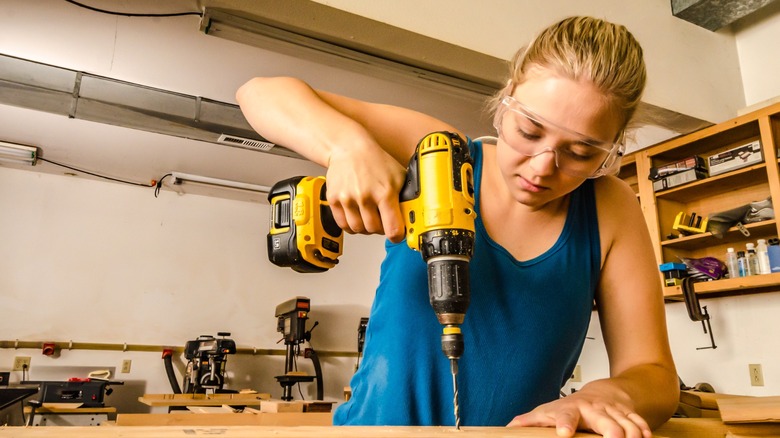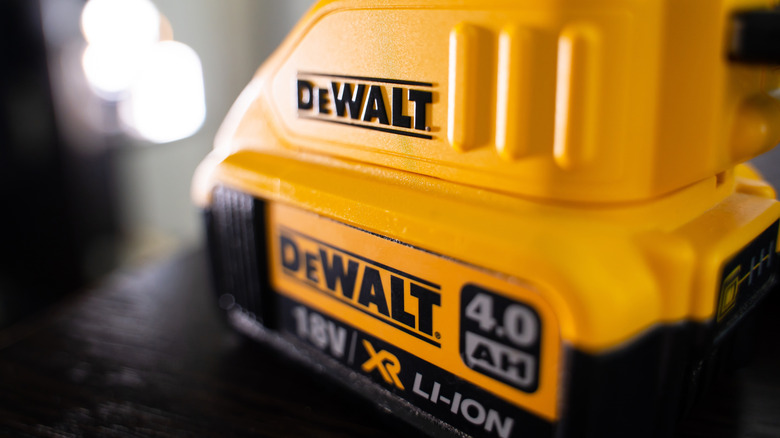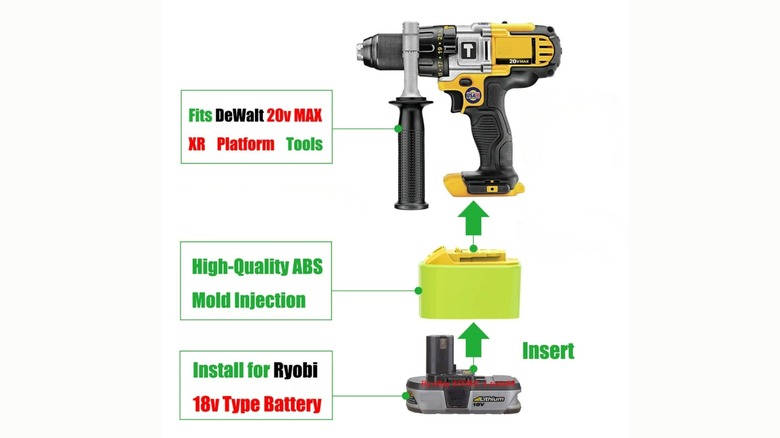Can You Use Your Ryobi Batteries On DeWalt Power Tools? Here's What We Know
We may receive a commission on purchases made from links.
Most users would agree that while DeWalt is arguably the most reliable power tool brand to buy from, Ryobi is the more budget-friendly option. So it's no surprise that many people end up with a mix of tools from both brands. If you've got a workshop drawer filled with both Ryobi and DeWalt gear, you've probably wondered whether you could swap batteries between them in a pinch. Maybe your DeWalt drill is sitting right there, but the only charged battery you have is a Ryobi. It seems like it should work, right? After all, they're both rechargeable lithium-ion packs doing the exact same job.
Well, we hate to break it to you, but Ryobi and DeWalt batteries are not interchangeable. The physical designs are completely different, which makes direct swapping impossible without some modifications. And before you start Googling adapters or thinking about DIY solutions, there are some serious risks you need to consider. But that's not even something unique to these two brands. Nearly every major power tool brand, from Milwaukee to Makita and Craftsman — you name it — uses proprietary battery designs.
You could say it's a business strategy to keep you buying within each company's ecosystem, but there are also legitimate engineering reasons why batteries aren't universal. However, legitimate or not, when you're mid-project and need power immediately, the fact that Ryobi batteries won't slot into your DeWalt power tools feels like a massive inconvenience. So let's help you understand exactly why these batteries won't work together and what happens if you try to force them.
Why the batteries physically won't connect
If you take a Ryobi ONE+ 18V battery and place it next to a DeWalt 20V MAX battery, you'll immediately notice that they look completely different. The DeWalt battery has a flat top with a panel containing several recessed power terminals, plus slide-on rails that lock the battery into place on DeWalt tools. It's a pretty standard design you'll see across multiple brands.
Ryobi took a different approach entirely. Its batteries feature a distinctive raised stalk protruding from the top, designed to plug directly into a corresponding port on Ryobi tools. The power terminals are located on the sides of this stalk, where they connect with receivers inside the tool. There are no slide rails because the connection method is fundamentally different. It's a plug-in rather than a slide-on.
So when you really think about it, the Ryobi battery has no way to physically attach to a DeWalt tool. Even if you could somehow jury-rig it to stay in place, the terminals wouldn't line up. The Ryobi's side-mounted contacts can't reach the DeWalt's recessed panel terminals. It's almost like trying to plug a USB-C cable into a Lightning port. The shapes just don't match, and as you can imagine, you could end up breaking the cable connector or damaging the port itself. And in this case, that could mean snapping off a terminal on your battery (which exposes you to all the dangers of damaged lithium-ion batteries) or frying the internal circuitry in your tool.
Third-party adapters exist, but they're risky
You'll find plenty of third-party battery adapters online that claim to bridge the gap between Ryobi batteries and DeWalt tools. These adapters essentially act as a middleman, clipping onto your Ryobi battery and providing a DeWalt-compatible connection on the other end. Technically, yes, they can make the physical connection work. But the problem is that these adapters bypass all the smart tech built into modern batteries: the circuits that regulate power flow, prevent overheating, and optimize performance for each specific tool.
When you force a connection through an adapter, you're essentially unregulating the power flow. That could mean your tool gets too little power to function properly, or worse, too much power that fries the motor. Some DIY enthusiasts have even attempted homemade modifications, opening battery cases and hardwiring connections, but this requires electrical expertise and is genuinely dangerous if done incorrectly.
But that's not even the biggest concern. Both Ryobi and DeWalt consider adapters and modifications to be warranty violations. If your drill burns out or your battery pack dies because you used an unauthorized adapter, neither company will replace it. You're on your own. So it's best if you stick with batteries designed for your tools, keep a spare charged for each system, and avoid one of the most common mistakes everyone makes when buying power tools: mixing and matching ecosystems. It's less convenient, sure, but it beats having to spend extra money replacing a damaged battery or tool.


